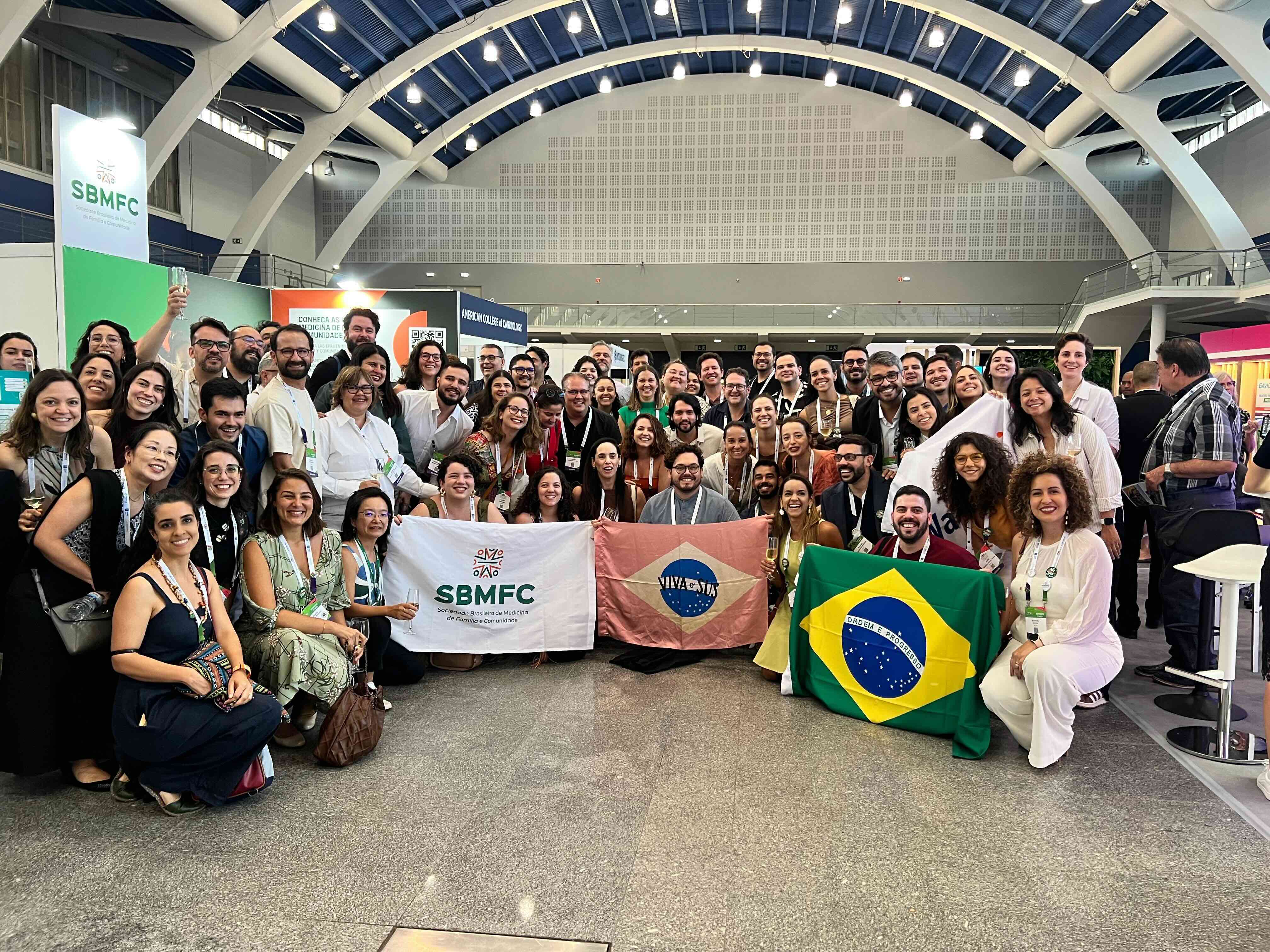Global Five Star Doctor Award 2025: Prof. Inez Padula
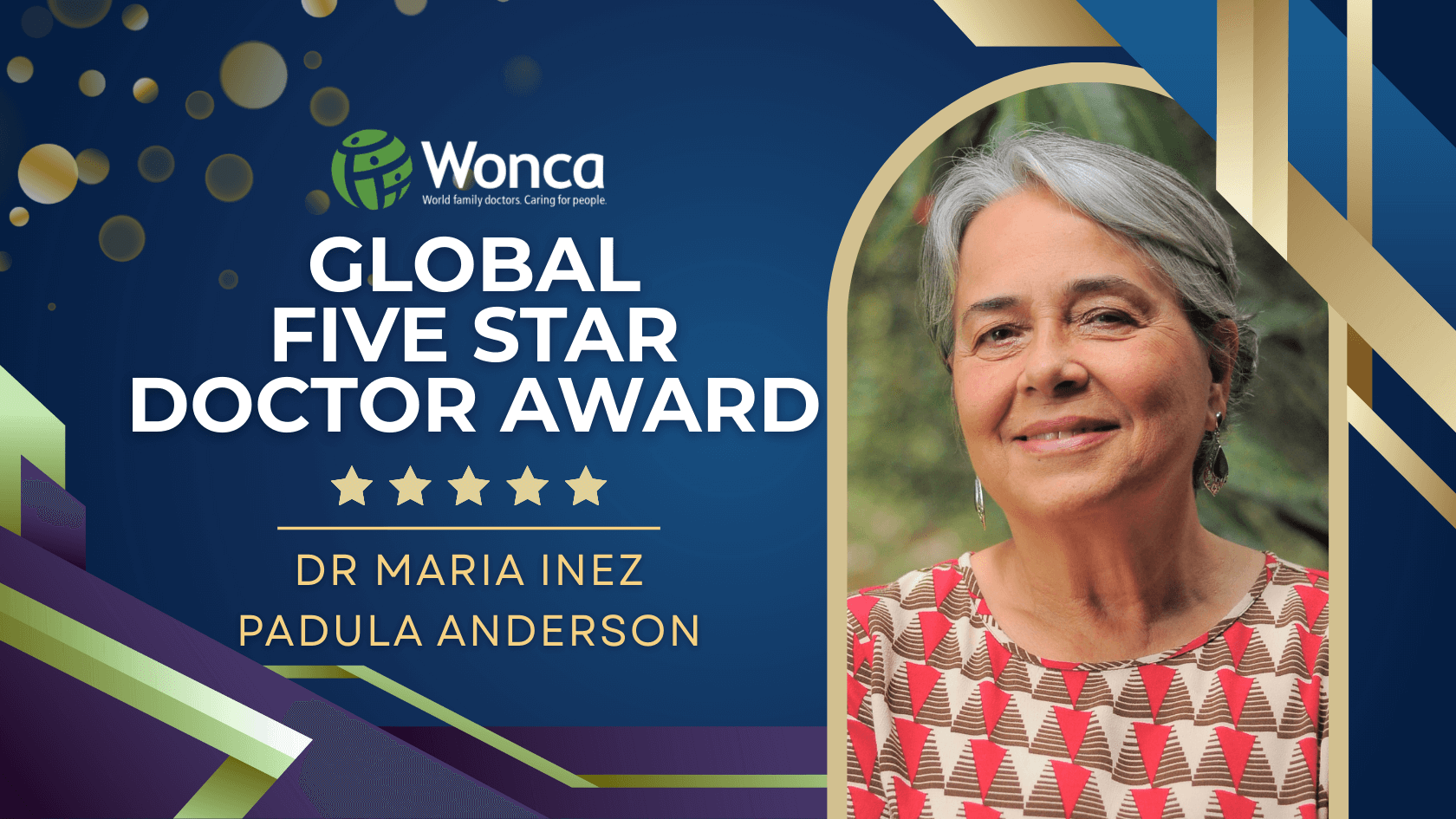
Announcing the 2025 Global Five Star Doctor Award Winner: Prof Maria Inez Padula Anderson (Brazil)
Announced at the WONCA World Conference in Lisbon on Saturday, 20 September 2025, Professor Maria Anderson of Brazil has been named the winner of the 2025 Global Five Star Doctor Award.
WONCA’s highest honour for Excellence in Health Care, the Five Star Doctor Award, is presented biennially at the World Conference to one outstanding family doctor, selected from the regional awardees of the past two years. The concept was introduced by WHO’s Dr Charles Boelen in 2000, and winners are judged on five roles: Care Provider, Decision Maker, Communicator, Community Leader, and Manager.
Each regional recipient is nominated by peers in recognition of their leadership, values, and dedication to improving health systems and patient care. The global winner exemplifies the spirit of family medicine—grounded in trust, compassion, and commitment to community health.
Professor Inez Padula, the 2024 regional winner for WONCA Iberoamericana-CIMF, has demonstrated outstanding contributions to education, equity, and public health over her 40-year career. Her work continues to inspire new generations of family doctors across Brazil and beyond.
My Journey in Family Medicine – An interview with Prof. Inez Padula
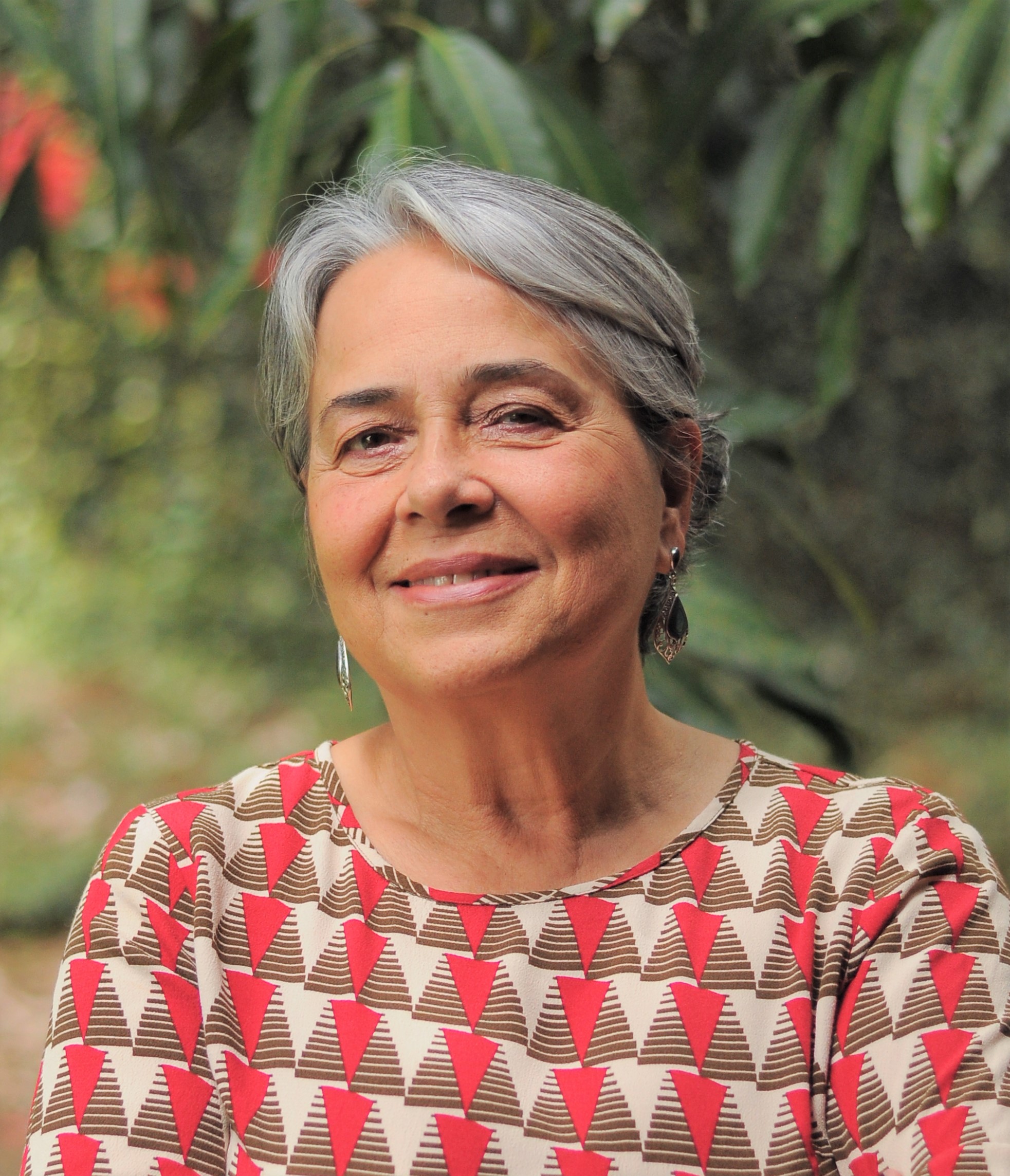 You trained and built your career at UERJ, helping shape one of the first residency programs in family and community medicine in Brazil. How did those early years influence the way you practise and teach today?
You trained and built your career at UERJ, helping shape one of the first residency programs in family and community medicine in Brazil. How did those early years influence the way you practise and teach today?
Being one of the first residents in a very new specialty in Brazil was a challenge in many ways, but it also served as an enriching source of knowledge and personal growth. It made me aware that the path ahead would be difficult due to prejudices against Family Medicine and the scarcity of adequate spaces for professionals to practice as Family and Community doctors. Despite these obstacles, this experience provided me with a meaningful way to practice medicine. I understood this approach by observing, learning, and working alongside Professor Ricardo Donato at UERJ, one of the pioneers of Family Medicine in Brazil. His mentorship shaped my commitment to the specialty and influenced my clinical practice. It also impacts how I teach and mentor others, today. Throughout this journey, I have defined my purpose and shaped my professional career as a professor at UERJ, guided by a dedication to advocating for the development of Family Medicine and a commitment to providing holistic, personalized, and community-oriented care grounded in familiar and social contexts.
You’ve spent much of your career in primary health care in regions of greater social vulnerability. Could you share a story or example that shows what this work has meant to you personally, and what impact it has had on the people you serve?
UERJ is a public university with a strong community-oriented profile, and Brazil remains a highly unequal country. Therefore, I have dedicated my career to primary healthcare focused on vulnerable populations. Before the development of the Family Health Strategy, primary care in Brazil was very limited. I clearly remember how difficult it was to see people sleeping on the sidewalk in front of the UERJ outpatient clinic, hoping to get a consultation.
One of my earliest community-based care experiences took place as part of a residency program, developed in a favela near the university. The community was made up of families who had fled a flood and received very small, precarious houses—until the state government could provide them with better housing—which, unfortunately, never happened. Those families lived in those conditions for about seven years. Witnessing poverty and a loss of hope so closely was very hard. The healthcare we provided offered those people a bit of dignity, especially because it was a type of care that treated them with respect and sensitivity, taking into account their social and psychological needs.
That time taught me an important lesson about the importance of the home visit and the community approach. It came from an incident involving two residents who entered a very poor household in that community to register a family. The conditions were so bad that one or two rats passed by while they were doing the registration. One resident asked the woman—mother of two small children—if she wasn’t worried about the rats… She replied, “Doctor, my concern is whether I will have food tomorrow to feed my children.” Reflecting on that situation, I, along with the residents, clearly realized that, as family doctors, our concerns—even if genuine—must always strongly consider and prioritize the needs of the people we care for.
Photos: Fabiano Gonçalves Guimarães, SBFMC President accepts the Five Star Doctor Awards on Dr Inez's behalf from WONCA President A/Prof Karen Flegg at the WONCA World Conference in Lisbon Portugal, 20 September 2025
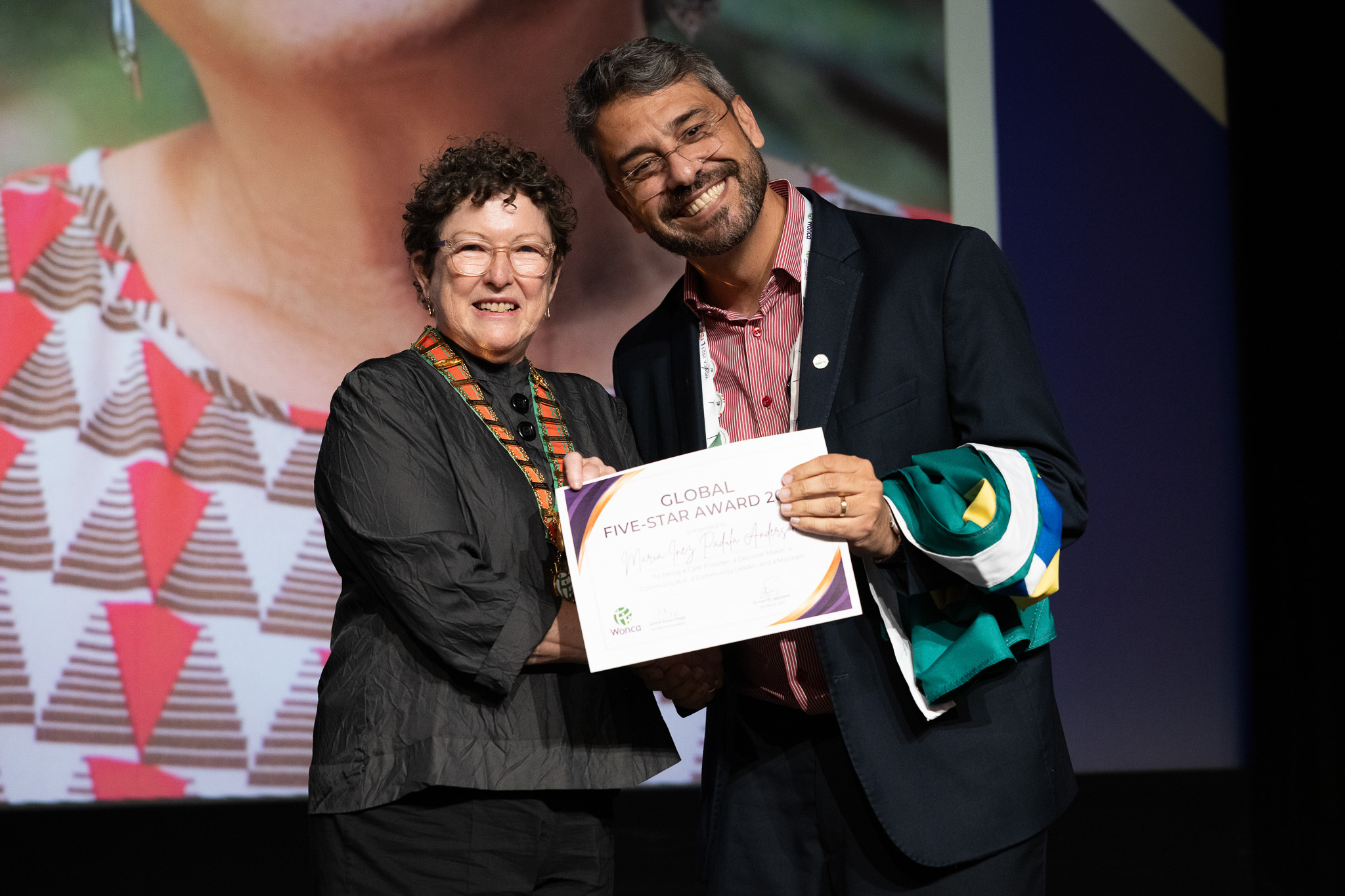
As President of the Brazilian Society of Family and Community Medicine and later WONCA Iberoamericana-CIMF, you led organisations through important moments for family medicine. Looking back, what achievements or turning points stand out most from those periods?
Related to the period of the presidency of the Brazilian Society of Family and Community Medicine (SBMFC) (between 2004 and 2008), it is important to note that SBMFC was emerging from a difficult period of stagnation, almost approaching deactivation. Everything was to be rebuilt. Among many other initiatives, the principal achievements can be summarized into three major axes:
1) Developing a multi-year plan to guide actions and set goals, formulated through the active participation of the entire board of directors and a concerted effort to include Family Doctors’ representatives from all 27 states of Brazil. Initially, only two states had affiliated associations, but this number increased to eleven by the end of 2008. Additionally, significant investments were made in organizing the secretariat and implementing marketing strategies, resulting in a substantial increase in membership—from 200 to 2,132 members—representing approximately a 1,000% growth since 2004.
2) Investing in scientific activities such as the Brazilian Congresses, the reorganization of the *Journal of Family and Community Medicine* (RBMFC), the Preceptors’ Workshop, the Guidelines Project, and strengthening ties with the Brazilian Association of Medical Education to emphasize the importance of including Family Medicine disciplines in undergraduate curricula. It is also worth mentioning the various certification exams, which have enabled many general practitioners to become family doctors after at least four years of work in primary care and passing the written exam, alongside curriculum assessments. Among the most successful initiatives of this period was the launch of PROMEF, a publication that contributes to improving clinical practice and expanding the clinical approach within the context of Family and Community Medicine and Primary Care. It was one of the first publications, if not the very first, developed by family physicians for family physicians.
3) Investing in political strategies through the establishment of regular communication channels with the Ministry of Health, especially with the Department of Primary Care and the Department of Health Education Management, as well as with other national and state health managers. The main goal was to strengthen these relations through the regular establishment of partnerships, aiming to reinforce Family and Community Medicine (FCM), improve the Family Health Strategy (FHS), and consolidate Primary Care in Health. At least ten face-to-face meetings were held with these institutions between 2005 and 2006
All these efforts, carried out with seriousness, had positive impacts on the recognition and respect for Family and Community Medicine and Primary Care—both nationally and internationally. We are no longer speaking a language that was difficult to understand. On the contrary, our presence is now felt, and our arguments have begun to make a difference.
Related to the period of the CIMF presidency (2013-2018), the strategy was similar—focused on active and participative planning, involving the board of directors and representatives of the affiliated national associations of Ibero-America. The aim was to improve understanding of the status of Family Medicine and Primary Care in each country, in order to develop a multi-year plan that addressed their specific needs and set achievable goals. I had to learn to communicate in Spanish, as Brazil was the only country, besides Portugal, that speaks Portuguese. It was a challenge, but it worked. At that time, online meetings were not as common as they are today, and communication mainly took place face-to-face during some national or international conferences or via email.
Another important issue was to value and share the scientific work of Ibero-American countries and family doctors, not only in Spanish and Portuguese but also in English. During that period CIMF organized three Summits:
VI Ibero-American Summit of Family and Community Medicine. Quito Declaration (Ecuador), 2014. “Universal Coverage, Family Medicine, and Social Participation,” ;
VI Ibero-American Summit of Family and Community Medicine. San José Declaration (Costa Rica), 2016. “Universalism, Equity, and Quality in Health Systems: Family and Community Medicine as a Central Axis.” ;
VII Ibero-American Summit of Family and Community Medicine.. Cali Declaration (Colombia), 2018: Forty Years of Alma-Ata: Family Medicine and Family Heath, a Path to Peace.
Each of these Summits was published as special issues of the Brazilian Journal of Family and Community Medicine (RBMFC), including the Letters—covering political decisions made and endorsed by ministers and PAHO representatives—and articles summarizing the work of the thematic groups carried out before, during, and after the Summits. All these materials are available in at least two languages (Portuguese and Spanish), and in some cases, in three languages (English, Spanish, and Portuguese).
The links to the materials for each Summit are provided above.
In addition to these important events, CIMF organized the 4th and 5th Ibero-American Congresses of Family and Community Medicine, each attracting more than 1,500 participants. The 4th was held in Montevideo, Uruguay, in 2015 (March 18-21), with the theme Quality and Equity in Health Care; and the 5th took place in Lima, Peru, in 2017 (August 16-19), under the theme Passion for Caring for People.
I believe that my colleagues in the WONCA family, from whom I received very good support and recognition, have improved, and valued their knowledge about our region.
Finally, I would like to say that it was an honor to be re-elected for two terms, whether in SBMFC or CIMF. It was a period of intense work, but also a great personal and professional fulfilment.
You have pioneered new approaches in residency training and distance education, including Telessaúde and the Specialization Distance Course in Family Health. Which innovations have you found most transformative for learners, and why?
Brazil is an almost continental country that requires at least 70,000 family doctors. Currently, we have about 15,000. Given this significant challenge, we had needed—and continue to need—political strategies to increase the number of family physicians beyond the Family and Community Medicine residency program, which we consider the gold standard for training specialists. Additionally, we must explore ways to facilitate access to quality practices in Primary Care, especially considering that Brazil has 5,570 municipalities, most of which are poor, with populations of less than 20,000 inhabitants.
During Lula’s first term as president (2003–2007), UNASUS (Open University of the Unified Health System) was implemented, enabling semi-presential specialization courses for all doctors working in Primary Care, particularly those in the Family Health Strategy. Another initiative from Lula’s government was Telessaúde, a platform available in almost every municipality, allowing doctors to discuss clinical cases—whether live or recorded—with Family Doctors or other specialists to better address patient issues.
At UERJ, I, along with other colleague, had the opportunity to coordinate and support the organization of these two initiatives throughout the state of Rio de Janeiro. Both initiatives continue to be very important for addressing the large gap between our needs and the reality we face.
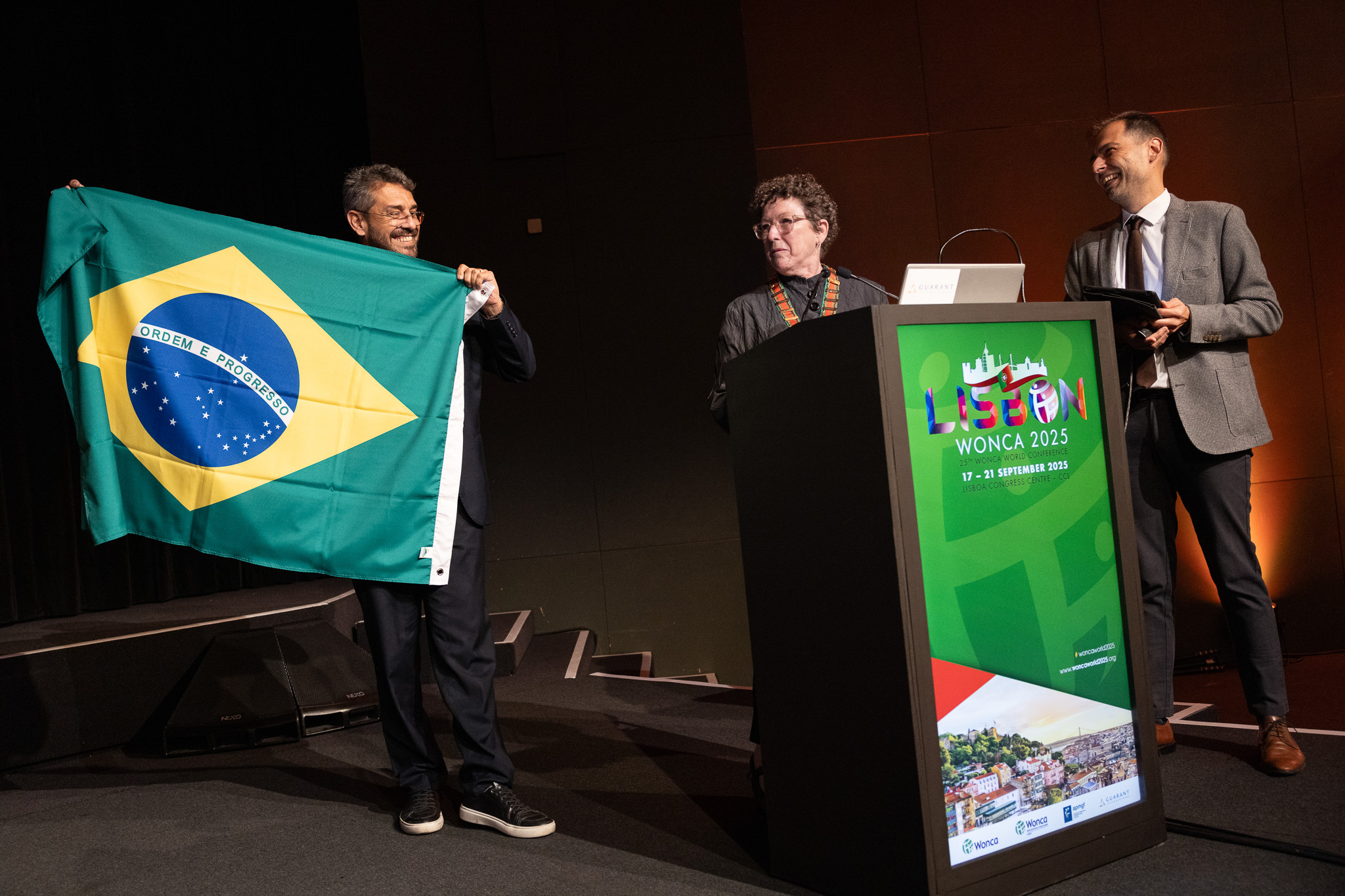
During the COVID-19 pandemic you played a role in countering misinformation and bringing evidence-based guidance to the public. How did you approach that responsibility, and what lessons did you take away from the experience?
During the COVID-19 pandemic, Brazil, like other countries, was immersed in a wave of denialism. We were under the extreme right Bolsonaro presidency, which, himself, was one of those spreading fake news about vaccines, about the (non) severity of COVID-19 (he claimed it was only a “little” flu), ineffective medicines, not wearing masks, and other absurdities. As the scientific director of SBMFC, at that time, I, along with other colleagues, promoted the development of evidence-based articles and protocols to clarify both the general population and family physicians, as well as other healthcare professionals. The lesson I learned is that, as family doctors, we have a social responsibility to communicate good medical practices to the community, given our proximity to them, throughout the life cycle.
What keeps you motivated? What is your hope for the next generation of family doctors in Brazil and around the world?
My motivation remains focused on the gravity of the life and health conditions of the population in general, most of whom live in countries marked by inequity. All people around the world should have the right to access health services with strong primary care and to have a family doctor to care for themselves and their families — we are far from this goal.
My hope is to continue contributing to the ongoing development and teaching of family and community medicine, grounded in knowledge, practice, and therapeutic tools based on a biopsychosocial and spiritual paradigm. This approach uncovers the interfaces and interactions between emotional, social, and cultural factors that influence the illness-health process. In this context, I hope that future generations of family doctors can promote person-centered medicine, rooted in a family and community approach, which includes caring for the health of the Earth — since our health is interconnected with that of our planet.
Photo: Some of the very large Brazillian delegation at the WONCA World Conference in Lisbon. Brazil had the fourth highest representation by country, after Portugal, the Netherlands and Spain.
